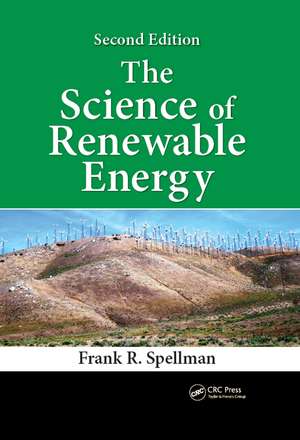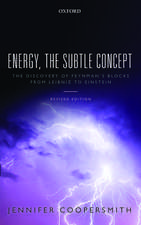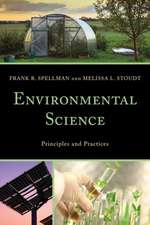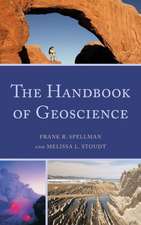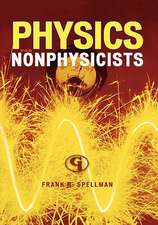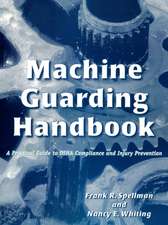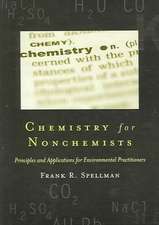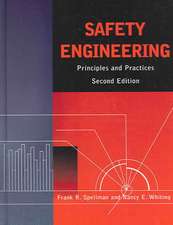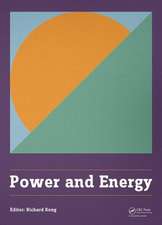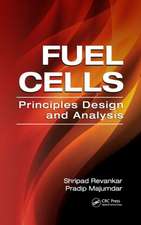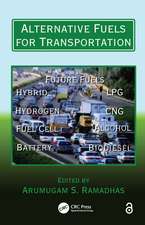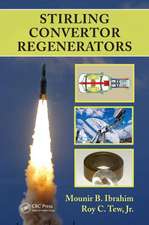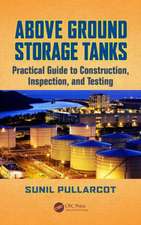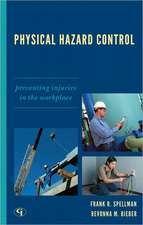The Science of Renewable Energy
Autor Frank R. Spellmanen Limba Engleză Hardback – 14 iun 2016
The Science of Renewable Energy, Second Edition takes a look at ways to produce sustainable and reliable energy sources and presents practical examples along with scientific methods, models, observations, and tools. Developed by esteemed author Frank R. Spellman, this book includes input from industry experts offering guidance and direction on obtaining self-replenishing energy from natural processes. The book focuses on the various forms of renewable energy derived from natural processes that are constantly replenished: solar energy, wind energy, ocean energy, wave energy, tidal energy, geothermal energy, biomass energy, hydropower energy, biofuels, and hydrogen fuel cells.
New in the Second Edition:
- Updates each chapter with current information including the latest innovations
- Elaborates on energy basics
- Adds important energy parameters dealing with both fossil fuel supplies and renewable resources (energy units as they apply to fossil fuel energy and renewable energy)
- Expands each chapter to include both the pros and cons of renewable energy production and use
Preț: 889.43 lei
Preț vechi: 1261.64 lei
-30% Nou
Puncte Express: 1334
Preț estimativ în valută:
170.19€ • 178.17$ • 140.82£
170.19€ • 178.17$ • 140.82£
Carte tipărită la comandă
Livrare economică 07-21 aprilie
Preluare comenzi: 021 569.72.76
Specificații
ISBN-13: 9781498760478
ISBN-10: 1498760473
Pagini: 580
Ilustrații: 226
Dimensiuni: 210 x 280 x 39 mm
Greutate: 1.23 kg
Ediția:Revised
Editura: CRC Press
Colecția CRC Press
Locul publicării:Boca Raton, United States
ISBN-10: 1498760473
Pagini: 580
Ilustrații: 226
Dimensiuni: 210 x 280 x 39 mm
Greutate: 1.23 kg
Ediția:Revised
Editura: CRC Press
Colecția CRC Press
Locul publicării:Boca Raton, United States
Cuprins
POST-OIL ENERGY. ENERGY BASICS. PRINCIPLES OF BASIC ELECTRICITY. SOLAR ENERGY. WIND ENERGY. HYDROPOWER. BIOENERGY. GEOTHERMAL ENERGY. BLUE ENERGY. FUEL CELLS. CARBON CAPTURE AND SEQUESTRATION.
Recenzii
"… essential for anyone wishing to explore the renewable energy world."
—Tom Hersh, Golden West College, Huntington Beach, California, USA
"… covers the most important aspects of renewable energy concepts… The environmental issues discussed at the end of each chapter add value to the subject. … shows how it is linked to environment ranging from resource existence, extraction/conversion, generation, delivery, use and exhaustion. The questions added at the end of each chapter are commendable as they help the reader to practice and test his/her understanding of the chapters."
—Al-Mas Sendegeya, Polytech of Namibia
"Dr. Spellman provides a passionate but grounded argument for the need for renewable energy options. This textbook provides many in-depth examples of real-world applications and calculations that can be adapted for various teaching purposes. The background material and questions in each chapter are relevant and compelling, guiding readers to grasp important concepts presented… includes in-depth discussions of the current oil-centric economy and a robust review of the peak oil economic scenario."
—Adam Kankiewicz, Solar Energy Scientist
"This is an outstanding book and deserves to be a standard text book. I hope, all those who are teaching courses on ‘renewable energy’ will treasure this book. I also believe, the book will appeal to any general reader who wishes to improve the understanding of the complex, fascinating and increasingly-important subject of renewable energy."
— Pulak Kumar Patra, Visva-Bharati University, West Bengal, India
"The book is written in easy-to-read style and will serve as a reference to undergraduates in renewable energy courses as well as non-specialists within the various energy industries. The author succeeds in achieving the goals of the book and it should find a ready audience among fossil fuel enthusiasts and renewable energy enthusiasts."
— Energy Sources Part A, September 2016
—Tom Hersh, Golden West College, Huntington Beach, California, USA
"… covers the most important aspects of renewable energy concepts… The environmental issues discussed at the end of each chapter add value to the subject. … shows how it is linked to environment ranging from resource existence, extraction/conversion, generation, delivery, use and exhaustion. The questions added at the end of each chapter are commendable as they help the reader to practice and test his/her understanding of the chapters."
—Al-Mas Sendegeya, Polytech of Namibia
"Dr. Spellman provides a passionate but grounded argument for the need for renewable energy options. This textbook provides many in-depth examples of real-world applications and calculations that can be adapted for various teaching purposes. The background material and questions in each chapter are relevant and compelling, guiding readers to grasp important concepts presented… includes in-depth discussions of the current oil-centric economy and a robust review of the peak oil economic scenario."
—Adam Kankiewicz, Solar Energy Scientist
"This is an outstanding book and deserves to be a standard text book. I hope, all those who are teaching courses on ‘renewable energy’ will treasure this book. I also believe, the book will appeal to any general reader who wishes to improve the understanding of the complex, fascinating and increasingly-important subject of renewable energy."
— Pulak Kumar Patra, Visva-Bharati University, West Bengal, India
"The book is written in easy-to-read style and will serve as a reference to undergraduates in renewable energy courses as well as non-specialists within the various energy industries. The author succeeds in achieving the goals of the book and it should find a ready audience among fossil fuel enthusiasts and renewable energy enthusiasts."
— Energy Sources Part A, September 2016
Notă biografică
Frank R. Spellman, PhD, is a retired adjunct assistant professor of environmental health at Old Dominion University, Norfolk, Virginia, and the author of more than 100 books covering topics ranging from concentrated animal feeding operations (CAFOs) to all areas of environmental science and occupational health. Many of his texts are readily available online, and several have been adopted for classroom use at major universities throughout the United States, Canada, Europe, and Russia; two have been translated into Spanish for South American markets. Dr. Spellman has been cited in more than 850 publications. He serves as a professional expert witness for three law groups and as an incident/accident investigator for the U.S. Department of Justice and a northern Virginia law firm. In addition, he consults on homeland security vulnerability assessments for critical infrastructures, including water/wastewater facilities, and conducts pre-Occupational Safety and Health Administration and Environmental Protection Agency audits throughout the country. Dr. Spellman receives frequent requests to co-author with well-recognized experts in several scientific fields; for example, he is a contributing author to the prestigious text The Engineering Handbook, 2nd ed. Dr. Spellman lectures on wastewater treatment, water treatment, and homeland security, as well as on safety topics, throughout the country and teaches water/wastewater operator short courses at Virginia Tech in Blacksburg. In 2011, he traced and documented the ancient water distribution system at Machu Picchu, Peru, and surveyed several drinking water resources in Amazonia, Ecuador. He has also studied and surveyed two separate potable water supplies in the Galapagos Islands, in addition to studying Darwin’s finches while there. Dr. Spellman earned a BA in public administration, a BS in business management, an MBA, and both an MS and a PhD in environmental engineering.
Descriere
This book presents a multidisciplinary approach to renewable energy, covering physical and engineering approaches and addressing economic, social, environmental, and policy issues. It surveys all of the principal renewable energy sources available and uses straightforward language with little emphasis placed on math and theoretical science. Instead, the emphasis is placed on the technical aspects and practical applications of renewable energy. This new edition is updated and adds information on the latest innovations related to all types of renewable energy sources and the related environmental implications.
